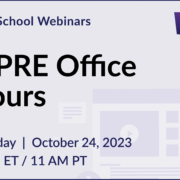Free MPRE Crash Course
Free MPRE Crash Course
When it comes to the MPRE, students often ask if there’s anything they can do to better prepare themselves for the exam. While we definitely recommend checking out a free MPRE course through a reputable bar prep company (check out ours, here!), there are some additional steps you can take in order to prepare.
Today, we’re taking a closer look at our MPRE Crash Course, which is a great way to start preparing for the MPRE, and it only takes a little more than an hour. Read on for more information on what we cover in our MPRE Crash Course.
Free MPRE Crash Course
What is the MPRE?
Before we start discussing what’s included in the MPRE Crash Course, it might be helpful to discuss what the MPRE is. The MPRE (or Multistate Professional Responsibility Exam) is a 60-question multiple-choice exam covering the ABA Model Rules of Professional Conduct. The NCBE administers the MPRE three times per year (March, August, and October/November). Students can take the MPRE electronically at Pearson VUE testing centers.
The MPRE includes questions on the following topics:
- Conflicts of interest
- Litigation and other forms of advocacy
- Regulation of the legal profession
- Client confidentiality
- Competence, legal malpractice, and other civil liability
- Different roles of the lawyer
- Communications about legal services
- Transactions and communications with persons other than clients
- Safekeeping funds and other property
- Judicial conduct
- Lawyers’ duties to the public and legal systems
Students have two hours to complete all sixty exam questions. There are no built-in breaks. This means that if you have to get up and stretch or use the restroom, that time comes off of the two hours you have to take the exam. While the MPRE contains 60 multiple-choice questions, only 50 questions are actually scored. Ten questions are “test questions” that the NCBE might consider using on future exams. Depending on the jurisdiction where you’re taking the MPRE, a passing score might be anywhere between 75 and 86. Check out our website for some more free MPRE resources!
MPRE Crash Course
Our free MPRE Crash Course focuses on highly tested areas on the MPRE. You can get access to our free MPRE Crash Course by signing up for our free MPRE course. The MPRE Crash Course (video only) is also available on Youtube. When you sign up for our free MPRE Course, you’ll be provided with access to the crash course, our MPRE course lectures, MPRE course outlines, and One-Sheets. We suggest accessing the crash course through our free MPRE course so you can access these additional free materials.
Our MPRE Crash Course is the perfect supplement for students who want to get a head start on the MPRE, might want some last-minute practice, or may have put off studying for the MPRE.
So, what does our MPRE Crash Course cover? We’re including some MPRE highlights below:
Regulation of the Legal Profession
Regulation of the legal profession makes up 6% to 12% of the questions on the MPRE. This includes the regulation of lawyers and how this rule applies when attorneys cross state lines. We reference portions of the outline throughout the crash course, including the above-referenced rule (which you’ll see below).
Additionally, this section of the crash course also discusses regulations surrounding admission to the bar and reporting attorney misconduct. Continuing, we also review violations of the rules of professional conduct, the unauthorized practice of law, and how attorneys can practice in multiple jurisdictions.
**Tip: To help remember when multi-jurisdictional practice is allowable, try using the mnemonic, “RAMS.”
Finally, we address supervisory requirements between partners, associates, and law clerks and prohibited restrictions regarding attorney employment as well as the sale of a law practice.
Lawyer/Client Relationship
The lawyer/client relationship accounts for approximately 10%-16% of the questions on the MPRE. What are the highly tested areas in this topic? They include formation of the lawyer/client relationship. Additionally, these rules provide what decisions clients can make within the attorney client/relationship as well as when the attorney must withdraw from representation.
Finally, we discuss requirements attorneys must abide by in order to keep clients informed about their cases as well as how they must comply with reasonable requests for information. This includes how attorneys handle their fees. You’ll also walk away with guidance about when contingency fees are allowable as well as when fee sharing is appropriate.
Client Confidentiality
Client confidentiality covers approximately 6%-12% of questions on the MPRE. In terms of highly tested areas, there are three main rules at play: attorney/client privilege, work-product doctrine, and duty of confidentiality. Take some time to review these three rules! While client confidentiality isn’t the most frequently-tested topic on the MPRE, with only three rules to memorize, this topic can be a great way to earn some points!
**Tip: Are you having trouble remembering the exceptions to the confidentiality rule? Try using the mnemonic “Memorize The C’s.” The “C’s” include (1) certain death or harm, (2) crime or fraud in which lawyer’s services have been used, (3) compliance with rules, (4) controversy between attorney and client, (5) court order, and (6) conflicts of interest detection.
Conflicts of Interest
There are more conflicts of interest questions on the MPRE than questions on any other topic. Conflicts of interest accounts for 12%-18% of the total number of questions on the MPRE. What types of questions appear under this subject area? Rules regarding concurrent conflicts are fair game.
We also highlight regulations related to permissive current conflicts, former client conflicts, former client conflicts at an attorney’s former firm, prospective client conflicts, and imputed conflicts of interest. Additionally, we cover restrictions related to business transactions with clients, gifts to lawyers, and literary or media rights. We include some discussion of compensation and how it can create a conflict of interest. This includes certain restrictions surrounding providing loans to clients, receiving compensation from a third party, and malpractice liability.
**Tip: Are you having difficulty remembering when attorneys can enter into business transactions with clients? Try using the mnemonic “FARIIS.”
Make sure you spend some time reviewing conflicts of interest and the accompanying rules! There is certainly a lot to memorize under this topic!
Competence, Legal Malpractice, and Other Civil Liability
Competence, legal malpractice, and other civil liability make up about 6%-12% of questions on the MPRE. This topic centers around two highly-tested rules. The first revolves around competence and diligence. Making sure to promptly respond to clients and refrain from procrastinating on client matters can help attorneys avoid professional misconduct issues in this area. Additionally, we discuss the requirements of a malpractice action between an attorney and a client.
One thing to keep in mind as you prepare for the MPRE is the difference between attorney discipline proceedings and legal malpractice claims. We give you some tips on how to keep track of these two concepts in the video, so be sure to check it out!
Litigation and Other Forms of Advocacy
This topic makes up approximately 10%-16% of questions on the MPRE. Here, we discuss rules surrounding how to start a legal matter, candor toward the tribunal, and ex parte proceedings. We review how lawyers need to handle disclosures of certain material, including material that might not be beneficial to their client’s case or position. Finally, we conclude by discussing fairness to the opposing party and legal counsel, communications with jurors, trial publicity, and rules pertaining to lawyers who have to act as witnesses.
Transactions and Communications with Persons Other Than Clients
Transactions and communications with persons other than clients accounts for only a small portion of the MPRE, coming in at around 2%-8% of the number of questions on the exam. What are some common issues that might appear on the MPRE under this category? These might include misrepresentations made by a lawyer (even if the client is insistent that the lawyer do so!). What actions of a lawyer constitute misrepresentation? Check out the chart below for help memorizing this rule!
We also cover how lawyers must handle communications with represented persons who are not clients as well as communicating with unrepresented individuals under this topic.
Different Roles of the Lawyer
The different roles of the lawyer makes up approximately 4%-10% of the total amount of questions on the MPRE. What are different roles that a lawyer might take on? Lawyers can act as advisors, and there are certain rules applicable to lawyers acting in this capacity. Additionally, lawyers also act as negotiators but face some restrictions in doing so. Finally, lawyers can also act as arbitrators, mediators, and other neutral third parties.
We also spend some time talking about prosecutors and other government lawyers. There are specific rules that apply to attorneys acting in this capacity, so make sure you are aware of those distinctions before heading into the MPRE! Finally, we cover attorneys who represent companies or corporations and how they must handles duties of loyalty and certain reporting requirements when working with those types of organizations. Specifically, there are some distinctions for attorneys engaging in certain securities work on behalf of corporations, so make sure to check out these distinctions!
Safekeeping Funds and Other Property
This is a smaller topic on the MPRE, making up about 2%-8% of the number of questions on the exam. One of the biggest things to be aware of under this issue is how to best handle client funds. Remember, client funds cannot be commingled with the lawyer or law firm’s personal funds. We also discuss when an IOLTA account must be used when managing client monies as well as how to handle monies in the event of a dispute.
Communications About Legal Services
Communications about legal services account for 4%-8% of questions on the MPRE. Here, we work our way through how lawyers can advertise for their services, restrictions covering reciprocal referral agreements, and how lawyers can solicit clients. Additionally, we discuss how lawyers can communicate about their services in compliance with the rules.
Lawyers’ Duties to the Public and Legal System
This makes up only a small portion of the MPRE coming in at 2%-4%. Under this topic, we discuss how a lawyer can provide volunteer legal services, things to be aware of when accepting or rejecting court appointments, and how attorneys can participate in law reform activities.
Judicial Conduct
Judicial conduct covers about 2%-8% of questions on the MPRE. These rules govern how judges must act in order to carry out their duties. These requirements are different than what an attorney might need to follow given that judges need to fairly preside over hearings on a multitude of issues. Additionally, we work through reporting requirements for judicial and attorney misconduct. Finally, we review disqualification, including when judges cannot preside over certain matters, how judges can participate in extrajudicial activities and restrictions on how judges can consult with government officials.
We hope you find this information useful, and we cannot wait to prepare for the MPRE with you! Check out our MPRE Crash Course here to learn more!
Looking to Ace the MPRE?
- Enroll in our 5-star rated free MPRE Course, complete with expert guidance, an exclusive outline, practice questions, and a one-sheet.
- Tackle the Real MPRE questions — the gold standard for test preparation.
- Elevate your preparation with personalized MPRE private tutoring, featuring a tailored study plan and dedicated MPRE outline.
- Dive into our assortment of complimentary top-notch MPRE resources for your success.












Leave a Reply
Want to join the discussion?Feel free to contribute!